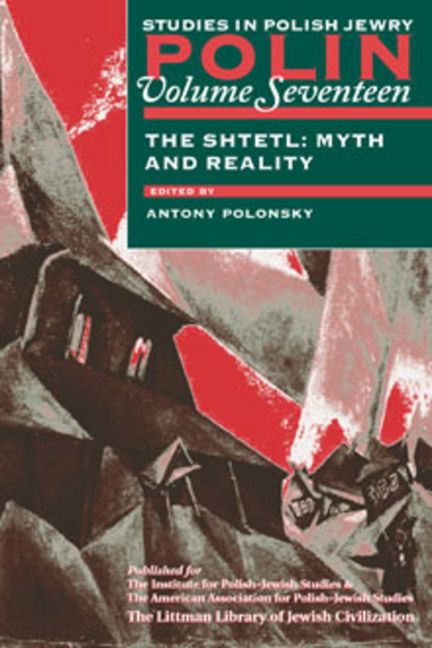Book contents
- Frontmatter
- Dedication
- Editors and Advisers
- Preface
- Polin
- Polin: Studies inPolish Jewry
- Contents
- Note on Place Names
- Note on Transliteration
- List of Abbreviations
- PART I THE SHTETL: MYTH AND REALITY
- Introduction. The Shtetl: Myth and Reality
- The Shtetl as an Arena for Polish–Jewish Integration in the Eighteenth Century
- Inter-Religious Contacts in the Shtetl: Proposals for Future Research
- The Hasidic Conquest of Small-Town Central Poland, 1754–1818
- The Drama of Berdichev: Levi Yitshak and his Town
- Polish Shtetls under Russian Rule, 1772–1914
- How Jewish Was the Shtetl?
- The Changing Shtetl in the Kingdom of Poland during the First World War
- The Shtetl: Cultural Evolution in Small Jewish Towns
- Small Towns in Inter-War Poland
- Jewish Patrons and Polish Clients: Patronage in a Small Galician Town
- Maintaining Borders, Crossing Borders: Social Relationships in the Shtetl
- The Soviet Shtetl in the 1920s
- Shtetl and Shtot in Yiddish Haskalah Drama
- Kazimierz on the Vistula: Polish Literary Portrayals of the Shtetl
- Imagining the Image: Interpretations of the Shtetl in Yiddish Literary Criticism
- Shtetl Codes: Fantasy in the Fiction of Asch, Schulz, and I. B. Singer
- Returning to the Shtetl: Differing Perceptions
- PART II NEW VIEWS
- PART III DOCUMENTS
- PART IV THE SIXTY-FIFTH ANNIVERSARY OF EVENTS IN PRZYTYK: A DEBATE
- PART V REVIEWS
- OBITUARIES
- Notes on the Contributors
- Glossary
- Index
Shtetl and Shtot in Yiddish Haskalah Drama
from PART I - THE SHTETL: MYTH AND REALITY
- Frontmatter
- Dedication
- Editors and Advisers
- Preface
- Polin
- Polin: Studies inPolish Jewry
- Contents
- Note on Place Names
- Note on Transliteration
- List of Abbreviations
- PART I THE SHTETL: MYTH AND REALITY
- Introduction. The Shtetl: Myth and Reality
- The Shtetl as an Arena for Polish–Jewish Integration in the Eighteenth Century
- Inter-Religious Contacts in the Shtetl: Proposals for Future Research
- The Hasidic Conquest of Small-Town Central Poland, 1754–1818
- The Drama of Berdichev: Levi Yitshak and his Town
- Polish Shtetls under Russian Rule, 1772–1914
- How Jewish Was the Shtetl?
- The Changing Shtetl in the Kingdom of Poland during the First World War
- The Shtetl: Cultural Evolution in Small Jewish Towns
- Small Towns in Inter-War Poland
- Jewish Patrons and Polish Clients: Patronage in a Small Galician Town
- Maintaining Borders, Crossing Borders: Social Relationships in the Shtetl
- The Soviet Shtetl in the 1920s
- Shtetl and Shtot in Yiddish Haskalah Drama
- Kazimierz on the Vistula: Polish Literary Portrayals of the Shtetl
- Imagining the Image: Interpretations of the Shtetl in Yiddish Literary Criticism
- Shtetl Codes: Fantasy in the Fiction of Asch, Schulz, and I. B. Singer
- Returning to the Shtetl: Differing Perceptions
- PART II NEW VIEWS
- PART III DOCUMENTS
- PART IV THE SIXTY-FIFTH ANNIVERSARY OF EVENTS IN PRZYTYK: A DEBATE
- PART V REVIEWS
- OBITUARIES
- Notes on the Contributors
- Glossary
- Index
Summary
PERHAPS the most intriguing characteristic of Yiddish drama of the Haskalah (Jewish Enlightenment) is that it tended to be written more for the page than for the stage. To put it another way: since there was no stable Yiddish theatre during most of the Haskalah period, it may strike us as curious that the ‘enlighteners’, or maskilim, chose to write dramas at all. The radical break in modern Jewish politics represented by the Haskalah was a necessary condition for the flourishing of secular Yiddish theatre and drama, but before that began in earnest, maskilim had been writing plays that were distributed among intellectuals, performed in schools, read in salons, and occasionally published. Considering that the maskilim themselves had little or no formal training in the craft of playwriting, their dramas are, more often than not, remarkably attentive to just the sorts of details that would work on stage, with distinctive characters marked off from or grouped together with each other by clothing, social class, speech, mannerisms, and point of view.
Haskalah drama also relies on a pronounced sense of place. The characters hail from, and reside in, a wide spectrum of locations on the central and east European Jewish map. Plays written and set in late eighteenth-century Germany feature visitors from England, France, and Poland. Dramas written in eastern Europe in subsequent decades present characters from cities, towns, and villages that are sometimes real, such as Kraków and Lemberg [Lviv], and sometimes fictional, such as Israel Aksenfeld's Nibevole or S. Y. Abramovitsh's Glupsk. Haskalah plays are set primarily in the shtetl, but take us to the city and the countryside as well, and all of these settings carry symbolic weight. Émile Zola once defined drama as ‘a fragment of nature seen through a temperament’—a notion that his contemporary Jean Jullien transformed into the more famous formula ‘A play is a slice of life placed on the stage with art.’ The plays of the Haskalah show us a corner of east European Jewish life through the temperaments of a group of writers who collectively paint a vivid, grotesque portrait of shtetl society.
- Type
- Chapter
- Information
- The Shtetl: Myth and Reality , pp. 213 - 232Publisher: Liverpool University PressPrint publication year: 2004



